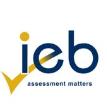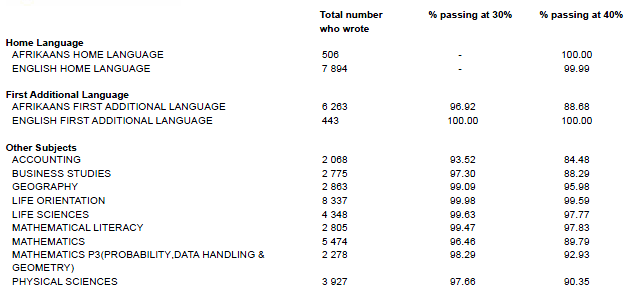IEB National Senior Certificate 2011
In 2011, 8281 learners from 173 schools across the country wrote the IEB National Senior Certificate examination. 205 more learners wrote the IEB examination in 2011 than in 2010. The 2011 pass rate is 98.15%, comparable to last year's pass rate of 98.38%. All of these candidates achieved a pass that is good enough to enter tertiary study at one of the three levels. 81.67% of the cohort achieved entry to degree study, comparable to last year's cohort while 14.37% qualified for entry to diploma study. 2.11% achieved entry for study at the Higher Certificate level.
It must be emphasised that the IEB does not have any private examination centres. All independent schools that write the IEB examination provide tuition for learners, and if the examination results are an indication, the tuition is of an exceptionally high standard. The IEB schools are lawfully registered with government, accredited by Umalusi and have been vetted by the IEB to offer its examination. Furthermore the majority are affiliated to one of the mainstream associations that exist to advise and support independent schools in maintaining a quality learning environment.
The IEB is committed to the promotion of mathematics and science in its schools. However the IEB is concerned about the drop of learners offering Physical Sciences at Grade 12 in the IEB, from 52.3% of all IEB students in 2008 to 47.4% in 2011. This appears to be a national trend with the decline in the percentage of learners offering Physical Sciences in the state NSC from 2008 to 2010 also showing a decline.
Despite this drop in overall numbers offering Physical Sciences, it is heartening to see the increase in the uptake of the subject by girls. This has changed from 45.5% in 2008 to 47.4% in 2011.
The IEB is optimistic that the recent curriculum revisions, the Curriculum and Assessment Policy Statements (CAPS) released in 2011, have addressed the overload in the demand in Physical Sciences thereby making it a more attractive option for learners. This initiative will hopefully arrest the decline in number of learners offering Physical Sciences.
The entry for Advanced Programme Mathematics, an extension programme offered by the IEB for both state and IEB learners, has increased from 1066 candidates in 2010 to 1294 candidates in 2011, an increase of just over 21%. The number of IEB learners offering Mathematics Paper 3 has remained constant at 41.6% of those who offer Mathematics.
This means that schools have a challenge ahead of them to prepare their learners for the changes envisaged by the new Curriculum and Assessment Policy Statements (CAPS) documents. These changes indicate that most of the current content of Paper 3 will be incorporated into Mathematics Paper 1 and 2 by 2014.
"It is important to note that all learners who have passed the NSC offered by the IEB have qualified for entry to further study at the higher certificate level, diploma level or degree level. A key purpose of schooling is to prepare our young people to take up their place in adult society, be it at an institution of further learning or be it in the workplace.
Whatever they do it is critical that they are trainable. The change from being a young person at school and a successful participant in our country's economy extends far beyond passing a Mathematics or History examination. A trainable youngster is one who has developed the maturity to understand that their educational destiny rests in their own hands, who understands that true learning goes beyond preparing for an examination and developing the cognitive skills required to do a job of work.
It requires the ability to take responsibility for one's behaviour, to prioritise one's time to focus on what is needed at the time and to be able to resist the temptations to put one's own pleasure ahead of the requirements of one's job or one's study demands," says Anne Oberholzer, CEO of the Independent Examinations Board (IEB).
"In the case of learners who want to be successful at university, it is essential that they are properly prepared at school both in terms of their cognitive base as well as the ‘soft' skills which are critical for tertiary study.
Learners do not only need to be responsible and be able to prioritise competing pressures when they get to university; they also need to be able to plan their programme of study, to persevere and not fall apart when challenged with difficult concepts or even failure, and to cope when having to manage what may seem to be an inordinate amount of work. Most importantly they need to know how to study independently, how to cope with situations that may be unfamiliar and face up to difficulties without the nurturing support of persistent teachers," adds Anne.
The Programme for International Student Assessment (PISA), a well-established international testing organisation made the following observation in the report on the results of the 2009 PISA testing sessions: " High-performing education systems stand out with clear and ambitious standards that are shared across the system, focus on the acquisition of complex, higher-order thinking skills, and are aligned with high stakes gateways and instructional systems."
"They have identified the aspiration of high standards as an indicator of a successful education system. However, high aspirations are only achievable if a learner's environment is committed to education. This means that parents encourage their children to respect the school and their teachers; it means that teachers have an appropriate working environment that recognises the importance of the work they are doing in building a workforce and citizenry we can all be proud of; it means that teachers accept the responsibility that has been placed on them and respond with dedication and passion to the challenges they face; it means that learners themselves realise that they are finally responsible for their own learning. The wonderful achievements of the IEB Class of 2011 have been made possible because of the hard work of the learners and teachers and the support they have received from their parents and schools," says Anne.
In an effort to encourage the development of the critical skills that successful students need, the IEB has added Advanced Programme English to Advanced Programme Mathematics which has established its worth for learners who pursue any mathematics-based course at university. The IEB's own research into the relationship between language ability and academic performance generally is well supported by international research. It was the recognition of the value of a well-developed language base which encourages critical engagement with literature and issues raised in a variety of texts that encouraged the IEB to develop the curriculum and assessment for this course.
"A pilot has been conducted this year with 119 students from 12 schools. The quality of the responses of learners to a challenging paper is very encouraging and reminds us that the quality and insight of South African learners should never be under-estimated. Schools have been encouraged to expose learners to the demands of this course through a tutorial style of delivery, encouraging self- study on the part of participating learners. As Jonathan Jansen has observed, a disposition to life-long learning is not developed through teacher-directed ‘prepping' of students for an examination but rather developing in learners a desire to discover and take responsibility for their own learning.
This attitude is not developed through cramming, drill and practice for an examination or focussing learning narrowly on examination requirements and what ‘counts for marks'. It is developed through on-going deep exploration of topics that are of specific interest to a learner. The Advanced Programmes in Mathematics and in the future, English, are not restricted to independent schools but include learners from state schools who wish to participate."
The Combined Abitur-NSC is a qualification offered by the German Schools in Cape Town, Johannesburg and Pretoria. The qualification consists of five subjects assessed by the IEB and seven subjects assessed by the German Education authorities. Through this government-to-government agreement, successful learners in the Combined Abitur-NSC are recognised by German education authorities for entry to German universities and by the South African education authorities for entry to South African universities.
Of the 56 candidates who offered this qualification, 55 passed with entry to tertiary study. The IEB sees its involvement with this qualification as a means of keeping South African students in touch with global standards and developments.
About the IEB
The IEB is an independent assessment agency separate from State and Provincial examination boards operating within the constraints of national legislation and provisions of the national quality assurance body, Umalusi. Umalusi has granted the IEB accreditation for the assessment of the National Senior Certificate.
The IEB offers examinations for client schools at the Grade 12 level, in line with national policy, based on the National Curriculum Statements and using various forms of assessment, including final summative examination and continuous assessment - i.e. orals, practicals and portfolios.
The School Section acts in accordance with Umalusi prescriptions and the provisions of Higher Education, using professional educationalists who are practising teachers in various subject disciplines. These teachers are active members of IEB Subject User Groups which engage with the curriculum and make recommendations on assessment practice based on real school experience.
Statement issued by Anne Oberholzer, IEB, January 4 2011
Click here to sign up to receive our free daily headline email newsletter


